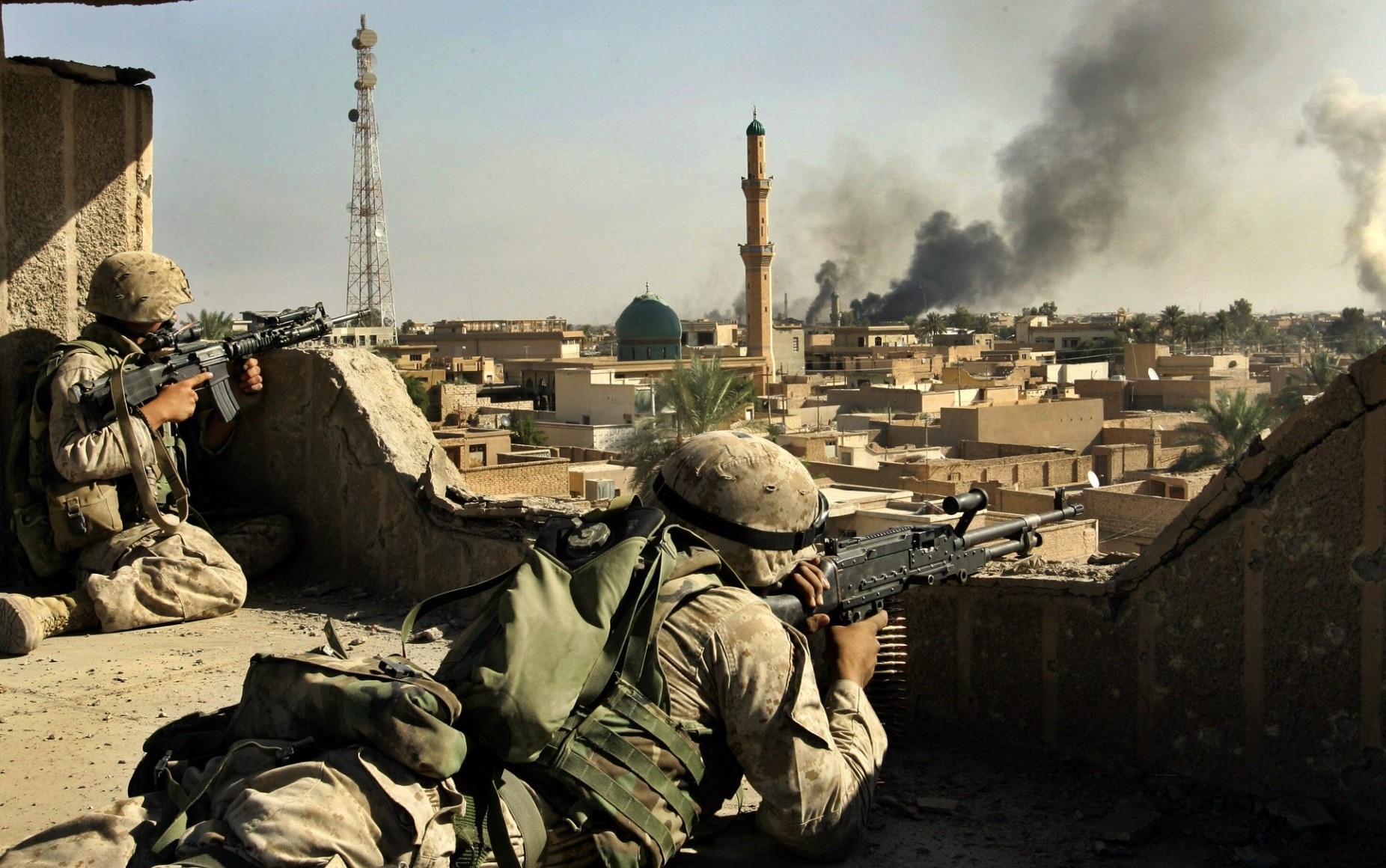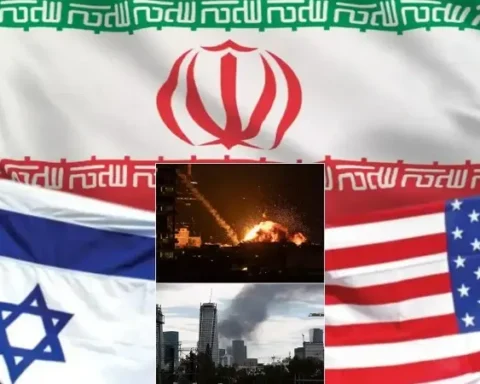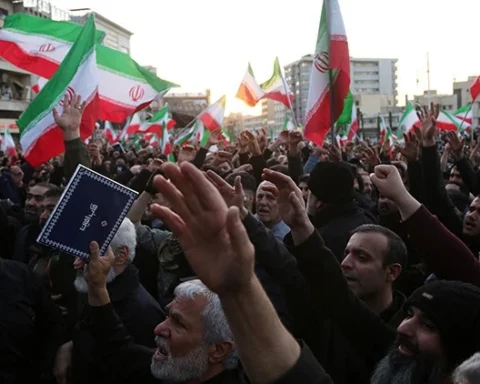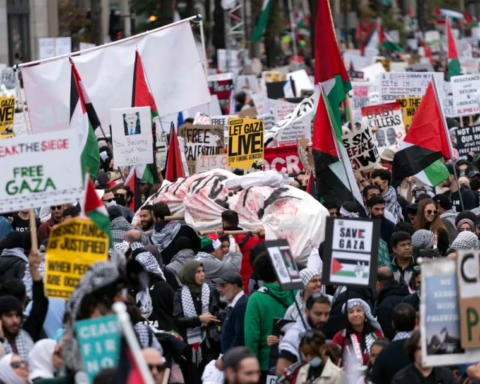Europe is on the war path with grandiose plans for building a war economy akin to the American military-industrial complex. As always, drumming up public support for war – manufacturing consent – calls for narratives ranging from spurring ‘growth’ at home to combating threats from foreign regimes that obstruct the west’s monopoly on endless capital accumulation. At any rate, European leaders’ enhanced belligerence is inextricably related to safeguarding the interests of monopoly capitalism, while Europe has made itself redundant through its unconditional servitude to the US.
Surplus absorption, endless war and wasted lives
Monopoly capitalism is characterised by a strong and systematic tendency for economic surplus to rise – absolutely as well as a share of total output – as shown by Paul Baran and Paul Sweezy in their seminal treatise on monopoly capital. Samir Amin further estimated that the economic surplus of advanced capitalist economies grew from 10% of GDP in the nineteenth century to 50% in the first decade of the twenty-first, a significant portion of which came from imperialist rent extracted from Global South countries. Capitalism thus has to continuously find new forms of surplus absorption to counter this overaccumulation. In general, surplus can be absorbed through (1) consumption (2) investment and (3) wasteful activities. David Harvey has also often discussed capitalism’s increasingly wasteful forms of surplus absorption, of which war is the most destructive. Governments play an important role in absorbing surplus that would otherwise not be produced, such as by subsidising the weapons industry (through military Keynesianism) to enable wars that facilitate further profit extraction, and so on in an endless doom loop.
The military-industrial complex has been the USA’s main industry policy under post-war military Keynesianism, as Yanis Varoufakis and others have pointed out. Now Europe is on the same path, diverting state funds to the production of weapons that destroy lives, societies and the environment under narratives of ‘self-defence,’ job opportunities while jobs in socially useful sectors remain vastly inadequate, and ‘growth’ that contributes no value – only waste and destruction. To quote Michael Roberts, “Keynesianism advocates digging holes and filling them up to create jobs; military Keynesianism advocates digging graves and filling them with bodies to create jobs.” Pouring billions into the war machine forebodes a policy of endless war to keep it greased and running, as well as a new wave of austerity for the many in Europe. Otherwise the growth spurt will be history – as will the political leaders who created it, their countries riddled with mountains of debt.
Capital’s profits from war extend way beyond weapons production. The destruction of war leads to plummeting living standards, devaluing natural resources and labour power i.e. the necessary labour required for survival (food, shelter, medicine, a healthy environment), increasing the rate of profit, the extraction of imperial rent, and access to resources and new markets in the wastelands it creates, primarily in the Global South. As Ali Kadri described in his analysis of the accumulation of waste, premature death, wasted nature and wasted lives are among the products of the war industry, commodities produced for profit, and which we consume.
It is clear that war is hugely profitable on multiple grounds, and the advanced capitalist world’s major preoccupation over the last decades. European states are now in the process of making it pivotal to their economies. The common narrative of ‘self-defence’ from hostile regimes necessitates the perpetual existence – or indeed, production – of such enemies. The multiple times this narrative has exploded in our faces, and literally in the lives of people elsewhere, does not seem to detract from its continuous reproduction. It is exploding right now in the form of a full-blown genocide in Palestine, and related proxy wars across the entire Middle-East, enabling massive profits for western arms companies and other corporate conglomerates involved in the economy of genocide, as well as further capital accumulation.
Military Keynesianism and Neo-Imperialism
The bipartisan US policy of military Keynesianism, which made the military-industrial complex a cornerstone of its economy after WWII, included virulently neoliberal anti-Keynesians like Ronald Reagan who invested heavily in the weapons industry, deploying Cold War rhetoric to orchestrate an arms race against the Soviet Union. To sustain the industry you need to keep waging and inciting wars. And they’ve been so very good at that, as we know – at starting new wars, escalating and sustaining old ones, and promoting conflicts where, directly or indirectly, American weapons often even end up on both sides. The neo-imperial mission of controlling the Global South’s vast resources, and ensuring the continuation of compliant political regimes, lay at the root of most of these conflicts.
Before the fall of the Soviet Union, the assault often relied on narratives of a ‘communist threat,’ especially in the US ‘backyard’ of Latin America. After 1990, it became heavily concentrated in the Middle-East, where the need to maintain the military-industrial complex was supplemented by the lure of monopolising the oil industry and strengthening the US dollar by, inter alia, recycling petrodollars, as well ensuring the perpetuation of the genocidal settler-colonial state of Israel to control and secure US interests in the region. Since the Cold War ended, we have been in the throes of a protracted “third world war” in the sense not only of the looming prospect of an imperialist WWIII (the recent assault on Iran being a case in point) but of a continuous or intermittent war against the third world in general, and the Middle-East in particular.
The motives of colonialism remain intact in the ‘post-colonial’ or, more accurately, neo-imperialist era: the perpetuation of global capitalism by resolving the capital–labour contradiction in the North and enabling accumulation by dispossession in the South. The means, though they have evolved, remain a closely intertwined and mutually reinforcing combination of military and multiple forms of economic warfare, such as unequal exchange through trade and the imposition of sanctions. The trade and finance regimes of institutions such as the WTO and IMF mimic and extend old colonial patterns of resource extraction and expanded market access.
Warfare, not welfare: Europe’s choice
Europe’s ‘landmark’ Readiness 2030 or ReArm Europe plan for unlocking up to $910 billion in combined military spending is part of military Keynesianism’s huge revival, endorsed by leaders across Europe and the UK. It is now being reinforced with a commitment from NATO countries to spend 5% of GDP on the military, as demanded by the USA in its bid to stop paying for the military ‘protection’ of Europe. With Europe’s military capacity already eroded by the Ukraine war, the investment opportunities created for US companies are enormous; billions of dollars worth of US-built weapons for Ukraine are already being financed by Europe. Purchases of new anti-drone systems, air and missile defence capabilities and the most powerful cyberwarfare systems are on the horizon, along with AI and quantum computing systems, all part of Europe’s commitment to build a force “fit for purpose in tomorrow’s world” – for which they’re now busy creating ‘tomorrow’s world,’ a world of endless war.
All this takes place under the auspices of a NATO led by an accomplished ultra-neoliberal warmonger who, after having expertly destroyed remaining vestiges of the Dutch welfare state, remains committed to wreaking maximal havoc in the rest of the world. No surprise; neoliberalism and military Keynesianism have been bedfellows for a long time. Keynesian policies are acceptable to neoliberals when they concern military spending. When it comes to public services such as education, healthcare, and environmental protection, they appeal to constraints of ‘fiscal responsibility’ or ‘balancing the budget,’ which are in fact baseless myths. Now resources risk being diverted away from Europe’s just transition to realising a warmongering future, stalled initiatives on upskilling/reskilling for green jobs to jobs in the military sector.
In his recent critique of military Keynesianism, Michael Roberts cited arguments currently being offered for rearming European capitalism by liberal Keynesian economic gurus and other apologists for the military state, including claims by the director of Chatham House that defence spending “is the greatest public benefit of all” as it is necessary for the survival of ‘democracy’ against authoritarian forces and “politicians will have to brace themselves to reclaim money through cuts to sickness benefits, pensions and healthcare.” So we can expect more austerity here, wasted lives elsewhere, and a reinforced assault on the environment globally. While supporters of the war economy emphasise ‘growth,’ even that claim appears to be unfounded: Michael Hudson estimates that Germany’s announced increase in military spending from under 2% to 3.5% will shrink the economy by 1% a year, and the non-military part by about 5%. This means more unemployment and cutbacks. Moreover, Europe is not even in a position to pull this off the way the US could thanks to its fiscal power, as Yanis Varoufakis pointed out.
However, Europe has declared its determination to pursue a warmongering future. The European Council’s press release a year ago unequivocally stated that Europe is shifting to a war economy. This involves doubling arms purchases from European industry by 2030 to “give more predictability to weapons corporations, including multiyear contracts to incentivize them to ramp up their production capacity.” The aim is to strengthen the European defence industry, and enhance “defence readiness, while creating jobs and growth across the EU.” “If we want peace,” the headline reads, “we must prepare for war.” The only sane response to that is an emphatic no; if we want peace, we must prepare for peace.
Manufacturing public consent
War economies rely on endless war to ensure their sustenance. As this occurs at the expense of public welfare at home, the war machine deploys its trusted ally, the propaganda machine, for producing narratives to justify its existence and actions. For instance, settler-colonial Israel needed to ‘defend itself’ against the indigenous inhabitants of the land it occupied by western decree. It thus obtained carte-blanche for genocide as well as invading Lebanon and Syria, and attacking Iran. Over the decades we’ve been fed innumerable such spurious narratives on regimes in the resource-rich Middle-East. ‘Authoritarian’ regimes need to be toppled when they safeguard their sovereignty and resources, or obstruct the expansion of western client regimes.
Similarly, the main narrative deployed for Europe’s Readiness 2030 plan is about defending Ukraine and Europe against the age-old Russian ‘enemy’ – Orwellian newspeak for NATO countries’ unrelenting escalation of the Ukraine-Russia conflict, as borne out by a wide spectrum of experts including Jeffrey Sachs, John Mearsheimer and Noam Chomsky, as well as international observers on the ground. Since 2008 the US/UK/NATO nexus aborted peace negotiations between Russia and Ukraine multiple times, finally sabotaging the Minsk Accords in 2022. President Volodymyr Zelenskyy was repeatedly dissuaded with reassurances of reinforced military aid and empty promises of NATO membership, seemingly aimed more at provoking Russia than helping Ukraine. In 2022 Noam Chomsky described the west’s intransigence as having left “the domain of rational discourse.” A closer examination of the west’s role in the conflict therefore seems in order.
Regardless of other aspects of the current Russian regime, its security concerns on being surrounded by a hostile military alliance, as well as for the safety of the Russian minority in Ukraine, are legitimate. It is also well documented by Ukrainian scholars, including Volodymyr Ischenko, that most Ukrainians favoured neutrality before 2014; only a tiny minority supported NATO membership. The neutral stance of democratically elected former President Viktor Yanukovych was thus fully in line with public opinion. Support for NATO rose to about 40% right after the Maidan massacres, partly because millions of ethnic Russians from Crimea and Donbas were excluded from the poll, as Ischenko pointed out. Still, what is crucial here and was suppressed until very recently, is what transpired at Maidan: the massacres were committed by far-right elements of the US-backed opposition, who then framed Yanukovych for them. These revelations in detailed analyses (2023) by Ukrainian-Canadian scholar Ivan Katchanovski, as well as documented on film, were recently confirmed in declassified Ukrainian documents and have now been published in journals and books – after years of censorship by western publishers, as well as Ukrainian media and government authorities, with considerable personal and professional consequences for Katchanovski. To date no one has been indicted for the massacres.
What followed Maidan is better known, but selectively disseminated: Yanukovych was ousted on the basis of these trumped-up allegations in a US-backed coup, which installed US client Arseniy Yatsenyuk. The ethnic Russian regions of Donbas broke away immediately after. Russia then annexed Crimea amidst fears it might become a NATO base. The west imposed sanctions on Russia far exceeding those on any other country; Ukraine’s military, spearheaded by the neo-fascist Azov regiment, invaded Donbas, where 14,000 were killed according to the UN. Between 2014 and 2021 Russia called for the political autonomy of the Donbas regions that had seceded, which was rejected with the Minsk sabotage. Russia then invaded Donbas in 2022, and the US confiscated Russia’s foreign exchange reserves. The war has had a huge economic impact on the rest of the world, in particular on the Global South. Meanwhile Ukraine has sold its farmland and mineral resources to American firms to pay its war debt, and any dissent against the Zelenskyy regime is severely repressed.
None of this is about European security; it’s the follow-up of trouble that started 35 years ago, in the context of the imminent reunification of Germany and disintegration of the USSR. President Mikhail Gorbachev proposed a Eurasian security system from Lisbon to Vladivostok with no military blocs. The US rejected this: NATO stays, they insisted, but the Warsaw Pact dissolves. However, it is an established fact that US and European leaders guaranteed multiple times in return that NATO would not expand even “one inch farther” (interestingly, President François Mitterand had initially indicated his preference for Gorbachev’s proposal). The west repeatedly reneged on those guarantees, exacerbating the situation by plundering Russia’s economy through the subsequent western-client regime of Boris Yeltsin. From a rival, Russia was reduced to an arena for western capital investment and a source of raw materials and low-wage highly skilled labour: a treatment generally reserved for the Global South. President Vladimir Putin’s regime is at many levels a consequence of this history. Taking that fact into account in diplomacy could set us on a path of de-escalation instead of the escalation currently underway.
Europe’s subjugation to American interests made it a laughing stock when it went as far as parroting the US narrative on the Nord Stream sabotage, accusing Russia of blowing up its own pipeline – despite the huge profits for the US at the expense of European citizens, energy security and the economy. Now that the US is showing signs of bowing out, the conflict could become a full-scale European proxy war, at the cost of European taxpayers, as well as Ukrainian and Russian lives. The current priority of the US is to isolate China, and as part of that to simultaneously win over and control Russia in a complicated geopolitical dance, a repetition-in-reverse of Kissinger’s divide-and-rule tactics in the 1970s, isolating Russia by engaging with China. Ukraine now faces a worse deal than the one it was dissuaded from accepting in 2022, while the destruction continues. But the prospect of any kind of brokered peace in Ukraine is leaving European leaders feeling abandoned rather than relieved; once bitten by the bug of war they no longer want to, or know how to, prepare for peace.
‘Defensive’ weapons strategy is an oxymoron when you simultaneously actively hinder peace. It also works reciprocally and could be self-fulfilling, unleashing another unfettered arms race. And once these weapons are produced, they are always used, generating more protracted proxy wars. The next target could be China, for the crime of undermining the imperial arrangement on which western capital accumulation depends – or likewise Iran and Venezuela. Media narratives and propaganda on all three countries is being ramped up accordingly.
Breaking the cycle of accumulation, waste and endless war
Apart from military expenditure, capitalism also depends on other wasteful forms of surplus absorption. David Harvey has identified endless urban transformation as another major one, which he once called the “American habit of getting out of crises by constructing more buildings and filling them with things.” The resultant urban and suburban sprawl of shopping malls and consumer palaces – mindless reconstruction projects that are essentially destructive, uprooting local working-class communities and attendant social structures, and demolishing affordable housing to sell goods that soon need to be replaced – contribute nothing to society, accumulating waste and destroying the environment. The Iraq war, for instance, combined both these consummately wasteful mechanisms: first death and destruction for profit, completely flattening the country, and rendering it a prime location for US corporate conglomerates to then take over ‘reconstruction’ by grabbing land and resources, and privatising services – a perfect example of disaster capitalism and accumulation by dispossession. An even more tragic case is unfolding right now in Gaza, in plans for the ‘day after’ or ignominiously named ‘Gaza Riviera,’ enabled by genocide. Harvey observed that capitalism’s inability to sustain accumulation through expanded reproduction is paralleled by a rise in attempts to accumulate through dispossession, a hallmark of neo-imperialism.
Perpetual growth for its own sake and surplus production are the very lifeblood of capitalism, necessitating a perpetual cycle of increasingly exploitative capital accumulation and wasteful surplus absorption, destroying the planet and human lives. From narratives on rogue regimes and terrorists across the world, to the obsession for guns among vigilante racist squads in the American mid-west to the necessity for Europe to ‘defend itself’ against a non-existent enemy, all are manifestations of demand created by an economy reliant on war and wasted lives.
The writing has been on the wall for a while. We urgently need to break out of the cycle by building economies that prioritise human and planetary welfare instead of perpetual growth: public services from healthcare and education to public transport and affordable housing, pensions and care for the elderly, job creation and guarantees in socially useful sectors, nature protection and the phasing out of fossil fuel dependence. Though beyond the scope of this article, there already exists a wealth of scholarship on designing degrowth economies – for instance by Jason Hickel, Giorgos Kallis and many others, and it is growing rapidly, including some brilliant ideas on applying modern monetary theory. Degrowth socialism is far from an impractical or idealist dream, yet capitalism remains entrenched. Ideological defeatism and the TINA (There Is No Alternative) mentality continue to reign. We cling to what exists because we can no longer imagine better alternatives. David Graeber attributed this to the final effects of the militarisation of American capital itself:
It could well be said that the last thirty years have seen the construction of a vast bureaucratic apparatus for the creation and maintenance of hopelessness, a giant machine designed, first and foremost, to destroy any sense of possible alternative futures … To do so requires creating a vast apparatus of armies, prisons, police, various forms of private security firms and police and military intelligence apparatus, and propaganda engines of every conceivable variety, most of which do not attack alternatives directly so much as create a pervasive climate of fear, jingoistic conformity, and simple despair that renders any thought of changing the world seem an idle fantasy.
Militarism is an essential feature of contemporary capitalism, and targeting this malign partnership in economies of war, genocide and dispossession, has to be the immediate priority. But the challenge extends way beyond that, in that capitalism continuously evolves increasingly exploitative means of accumulation and wasteful surplus absorption. That’s how it survived for so long. Real change will not come until capitalism is dismantled – through collective struggles in the Global South and North. As Northern workers pay with their taxes and their labour for the annihilation of Southern workers’ lives through war and genocide, a new International has never been more desperately needed.
As for Europe – if it wants to count at all in a rapidly changing world order – it needs to break away from the US-led imperialist axis and engage in partnerships elsewhere. It’s high time NATO was dissolved. As historian Richard Sakwa observed, “NATO’s existence became justified by the need to manage threats provoked by its enlargement.”
Source: https://znetwork.org/znetarticle/capitalism-and-endless-war/






